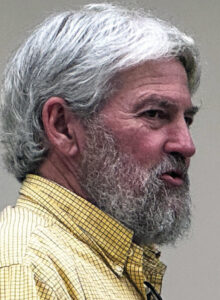Falling for the Nigerian Scam'
By By Suzanne Monk / managing editor
April 4, 2004
If you have an e-mail account, an Internet con artist has probably already tried to hook you with the "Nigerian Scam." Even if you don't know it by that name, you've seen the letters. I get two or three a week.
Don't think people don't fall for this, because they do. Retired Meridian businessman Jack Stack did. Here's what brought everything to a head and the timing was unfortunate.
As the World Trade Center fell to the ground in New York City, on Sept. 11, 2001, things were going awry for other reasons at Citizens National Bank in Meridian.
During the previous week, Stack had deposited two checks into his Industrial Energy Inc. account. Both were purportedly from J. Walter Thompson USA Inc., one for $495,000 and one for $245,000.
On Sept. 7, Stack instructed the bank to wire the $495,000 to the account of "Atlantic Chemical Co." in, of all places, Beirut, Lebanon. On the 10th, Stack instructed the bank to wire the $245,000 to "First Dolomite Co.," also in Beirut.
Sometime on Sept. 10, both checks bounced.
The next morning, Citizens National Bank employees were trying to reclaim the wire transfers. Unfortunately, banking systems were going down right about that time in the confusion that followed the 9/11 terrorist attacks.
CNB got the $245,000 wire back, but was unable to retrieve the one for almost a half-million dollars. Bank officers demanded the $495,000 from Stack, who told them he was expecting $500,000 in the next couple of days. It came, this time a check he received supposedly from Hershey Foods Corp.; Stack remarked to the teller that the check "might not be good" as he deposited it.
It wasn't. Stack didn't forge it, but it was forged nonetheless. The two checks from J. Walter Thompson USA Inc. also turned out to be fraudulent.
When Stack didn't repay the money, Citizens National Bank sought to settle the debt by filing suit in Lauderdale County Circuit Court in December 2001.
Back to the beginning
It is unclear what version of the Nigerian Scam took Stack in. The initial pitch came by telephone from a con man who appealed to him as a fellow Gideon.
According to court documents, Stack was under the impression that his bank account would be used as a landing place for money from "contacts" in South Africa. In exchange for providing a conduit for the funds, and his advice about investing in the oil business, he would receive $29 million.
He began by sending five wire transfers totaling $500,000 from his personal account presumably to pay the fictitious "fees" and "duties" for which the Nigerian Scam is famous. Then, he used his corporate account to send out 10 more wires totaling $1.5 million of his own money and that of family members and business associates.
When Stack could get no more money to wire to his contacts, the con artists changed tactics. It was at this point, court documents state, that Stack switched to the checks sent from South Africa. He says he didn't know why the checks from J. Walter Thompson or Hershey Foods had been written and he didn't ask.
All of this took a couple of years. During that time, lots of people told Stack that it had to be a swindle and to stop sending money to South Africa.
But, I'm guessing that at a certain point, it's hard to stop. If you've already sent hundreds of thousands of dollars overseas, in anticipation of getting $29 million, it probably feels like there's no turning back.
It just has to work.
A trial that didn't happen
Stack's trial had been set for March 29 before Circuit Judge Robert Bailey. Lawyers from both sides had exchanged information and interviewed witnesses.
Henry Palmer, representing Stack, planned to present a defense that went like this: You're grown-up bankers. If you wired the money without first making sure the checks were good, that's your own fault.
Palmer was also prepared to argue that the bank couldn't come after Stack personally; it could only sue his corporation. Finally, Stack had filed a counter-complaint against the bank for slander and breach of fiduciary duty.
On the other side, attorney Don Rogers, representing Citizens, had filed a motion for summary judgment.
In effect, Rogers' motion claimed there was no need for a trial because there was nothing for a jury to decide. It listed 255 separate statements made during depositions of potential witnesses that Rogers said proved his case, including these from Stack: "It just was the biggest scam," "I was stupid and greedy, I guess" and "I just wanted my money. I was like a rat. I just wanted out of the trap."
Judge Bailey agreed with Rogers. He dismissed Stack's counter-complaint, granted the bank's motion and ordered Stack to reimburse the bank $495,000 plus interest.
But, that hasn't happened yet, nor is it likely to soon. Palmer is appealing the case to the Mississippi Supreme Court, and I'll update you as there are developments.
How the swindle works
Beware of con artists running the "Nigerian Scam." They have hundreds of pitches:
The supposed widow of the former president of the Congo e-mails you out of the blue. She says now that her husband is dead, his political enemies are trying to seize his assets. If you'll let her deposit $50 million in your bank account, just to get it out of the country, she'll give you 25 percent.
You get an e-mail from a supposed civil servant in Nigeria. It seems a previous regime had been over-invoicing oil contracts, and he has discovered there's $87 million floating around "off the books." Rather than give it to the current government, he and his partners want to get it out of the country by transferring it to a foreign bank account. If you'll let them use yours, they will cut you in for $30 million.
The pitch letter always emphasizes the need for secrecy. The scammers ask for your bank account
information and some of your letterhead to get the ball rolling.
But, they don't actually raid your bank account. Instead, the crooks tell their "mark" all about Nigeria's cumbersome bureaucracy and how many people they're going to have to bribe before they can transfer the money. So, the victim sends money to buy a Mercedes for a corrupt official. He sends money to pay invented tariffs. He sends money for "filing fees" and "export duties."
The victim never receives the money he was promised. At some point, the scammers simply disappear into thin air and cannot be tracked.
The Nigerian Scam is not new, nor is it restricted to Nigeria although it's a growth industry there. Potential victims used to receive letters in the mail. Next it was faxes, and now mass solicitations by e-mail and phone.
To see examples of pitch letters, visit www.urbanlegends.com.








